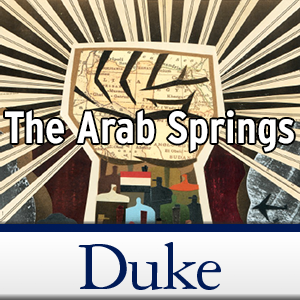Arab Springs
Subscribed: 3Played: 19
Subscribe
Description
Beginning in January 2011, a wave of broad-based revolts in the Arab world ruptured the political status quo at national, regional, and international levels. The ubiquitous slogans of these revolutionary movements have been freedom, social justice, and dignity. The world watched as activists toppled regimes in Tunisia and Egypt. Demands for change spread to other countries, including Bahrain, Syria, Yemen, Libya, Algeria, Morocco, and Jordan, among others. These movements have been met with various degrees of repression, and in the Libyan case, Western intervention.
The revolutionary uprisings raise questions, relevant well beyond the Arab world, as to what kind of “other world,” politically and economically, might be possible at this world historical moment: How have these societies already been fundamentally transformed? What will the new social and political formations in the region look like? What is the impact of the forces of repression, injustice, and indignity: autocracy, militarism, Western imperialism, Islamism, neoliberal capitalism, and military occupation? How are discursive strategies crucial to the revolutionaries and counter-revolutionaries? What does freedom mean for these revolutionaries? Who does dignity include and exclude? To what degree will social justice be part of “democracy?” How will women, ethnic and religious minorities, and migrant workers fare? Will economic injustice and poverty be addressed? Will brutal and unaccountable military and security apparatuses be transformed?
The Duke University Middle East Studies Center (DUMESC), in collaboration with the Center for the Study of the Middle East and Muslim Civilizations at UNC-Chapel Hill (CCSMEMC), has organized an interdisciplinary conference, “Arab Springs: Revolution and Repression,” that will explore these questions from multiple perspectives. The conference will also address some of the artistic, technological, visual, and media dimensions of these struggles and transformations, including slogans, graffiti, poetry, cartoons, and songs, as well as the circuits of state controlled television, al-Jazeera, Facebook, Youtube, Twitter, and texting. Conference participants will include academic experts, activists, Ph.D. student researchers, cartoonists, poets, and other artists.
The revolutionary uprisings raise questions, relevant well beyond the Arab world, as to what kind of “other world,” politically and economically, might be possible at this world historical moment: How have these societies already been fundamentally transformed? What will the new social and political formations in the region look like? What is the impact of the forces of repression, injustice, and indignity: autocracy, militarism, Western imperialism, Islamism, neoliberal capitalism, and military occupation? How are discursive strategies crucial to the revolutionaries and counter-revolutionaries? What does freedom mean for these revolutionaries? Who does dignity include and exclude? To what degree will social justice be part of “democracy?” How will women, ethnic and religious minorities, and migrant workers fare? Will economic injustice and poverty be addressed? Will brutal and unaccountable military and security apparatuses be transformed?
The Duke University Middle East Studies Center (DUMESC), in collaboration with the Center for the Study of the Middle East and Muslim Civilizations at UNC-Chapel Hill (CCSMEMC), has organized an interdisciplinary conference, “Arab Springs: Revolution and Repression,” that will explore these questions from multiple perspectives. The conference will also address some of the artistic, technological, visual, and media dimensions of these struggles and transformations, including slogans, graffiti, poetry, cartoons, and songs, as well as the circuits of state controlled television, al-Jazeera, Facebook, Youtube, Twitter, and texting. Conference participants will include academic experts, activists, Ph.D. student researchers, cartoonists, poets, and other artists.
5 Episodes
Reverse






